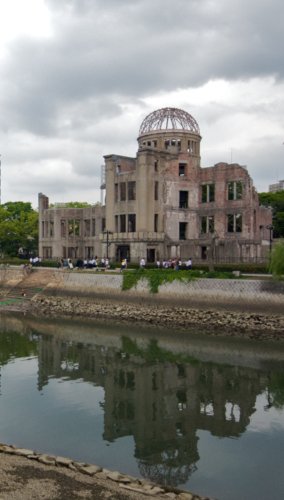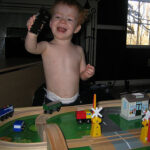Peace can only be achieved through non-violence. This is something we have to train and educate our children to put into effect. – Dalai Lama

The weapons of war grow more terrible by the decade. We will find peace, but will it be peace on Earth, or the peace of eternal rest?
What does that mean?
This is an interesting quote, because talks about the history of mankind and the inability of violence to settle differences. This is with one exception: the wars which wipe out a civilization or a people. All stated with just eight words.
The quote then recognizes that the people presently in charge are not likely to do things any other way. We, the adults, have already learned what we have, and will continue to act accordingly. Yes, we can learn new things, but change is a little more difficult for those with habits already formed. Which is why the quote concludes by mentioning that children are the answer.
They don’t yet have deeply ingrained ideas about war and peace. They can be shown that wars have only led to more wars. That peace only comes from a peaceful attitude and negotiations, or in utter annihilation.
By teaching the children, we stand a chance of breaking the cycle of violence which has not abated in all the centuries of humanity. Yes, there will always be unstable or evil people who will find their way into positions of power, but the better educated the children are, the less likely it is to happen.
Why is educating the children important?
Children are the future. How we educate them, what values we instill in them, and how we shape their attitudes will determine the future path of all of humanity. Think about that the next time you see a bunch of children. What lessons are they learning from society and from their play?
Children learn in a number of ways. Imitation is one key method. Can we provide the example for them to follow? Can we practice non-violent ways of resolving disputes? Can we show them both that it can be done, and that it can succeed? What do they learn if we do not even try?
Children will have a range of attitudes, and some will need more guidance than others to find their way. Others will have to grow into it after trying other methods and failing. But we can help them understand, we can attempt to educate them. To fail to do that is to fail them and their future.
Where can I apply this in my life?
Consider what the future would look like if every child was taught that might made right, and that only the strongest and best in battle had any rights? How long would it take to regress to the dark ages again? What do you think, would it be one generation or two?
I believe that we could see a similar change in societies around the world if we could teach children the concepts of non-violence and tolerance. Yeah it will be a tough sell in some parts of the world. And children go through phases, but I believe they will grow to understand these concepts.
However, if we don’t try, if we don’t start teaching the children that there is an alternative to force, we will condemn them to making the same mistakes we have made, as their background will be the same as ours. As adults, we owe the children a better world. Teaching them that there is a better way is one part of our obligation to them.
As mentioned before, we can be examples for them to see, believe, and imitate. Do we jump up and down, yelling and screaming at the kid’s sports games? Just because the umpire (or referee or…) is an idiot, and blind to boot, doesn’t mean we get to behave like a jerk, right?
Can we hold it in? Can we show them that yelling and screaming doesn’t work? Can we show them that violence only begets more violence? Can we show them that kindness takes more strength than anger? Can we be the teachers that they need?
It’s a tough road, but a worthy one, in my estimation. We have all of human history, stating again and again that violence doesn’t solve problems. Even when an entire people or nations are conquered, eventually they rise up again. Only by complete extermination of a people or a country ever solves the problem. And that’s not an ethical option, is it?
So that leaves us with a challenge. As the grown-ups in the world, how do we start to bend the curve away from violence and towards peace? We have to start teaching, both in word and in deeds, that it is possible. That could be a challenge for some of us, but what are the alternatives?
Every year the weapons become more terrible, and eventually, things will go badly for humankind. Not just this group, that country, or an ethnic group, but for all of us. That is the scale of war of which we are capable. We must end war before it ends us.
From: Twitter, @DalaiLama
confirmed at : it’s his own feed…
Photo by Kevin Jones
Related articles
- Youths Actively Engage for Sustainable Peace (solomontimes.com)
- Summer of Peace parade-goers preach non-violence (fox6now.com)
- They progress as we stay backward (arabtimesonline.com)
- How our education system hinders children’s ability to learn (voxxi.com)







Pingback: It is the failing of youth not to be able to restrain its own violence. | philosiblog
The problem is that it seems to me the world is becoming more violent every year. I thought by this time in my life, it would have gotten better. Very disappointing.
Agreed. However, there are always chances for things to get better. I imagine it will take a very serious incident to shock the power-mad into either calming down, or their people to depose them.
The transition from war as the first act to peace and reconciliation as the first act will not be easy, nor will it be done evenly across the globe.
But when the big dogs finally sit down and focus on what we have in common rather than what divides us, the rest of the world will have little choice but to follow suit. Until then, the Sword of Damocles will hang over all our heads.